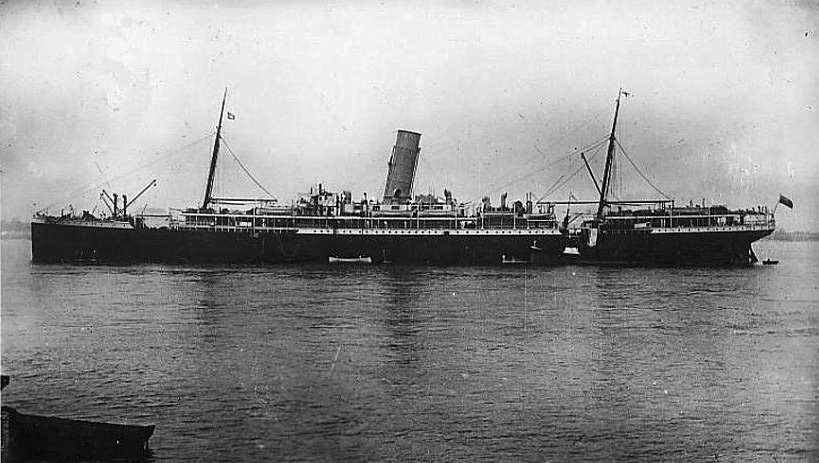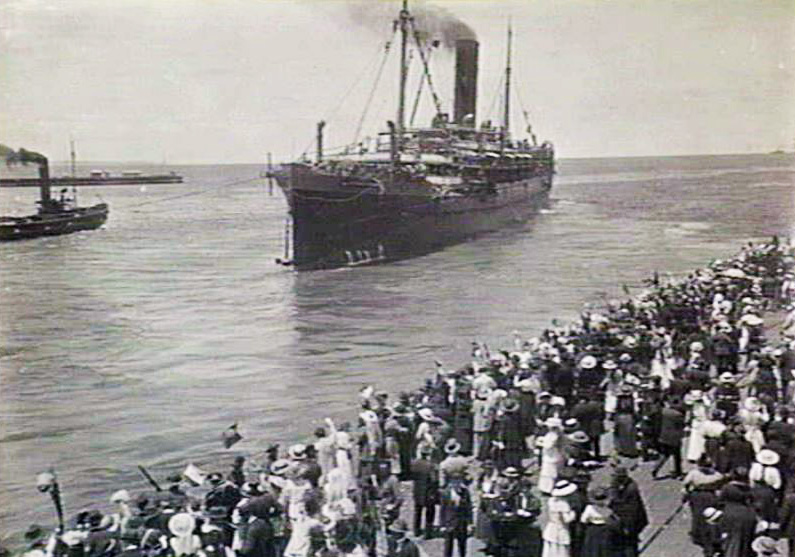Difference between revisions of "RMS Orontes"
From Our Contribution
| (9 intermediate revisions by the same user not shown) | |||
| Line 1: | Line 1: | ||
| − | {{Infobox | + | {{Infobox ship |
| − | | | + | | image = [[File:SS_Orontes.jpg]] |
| − | |||
| − | |||
| − | |||
| − | |||
| − | |||
| − | |||
| caption = | | caption = | ||
| − | | | + | | image2 = [[File:SS_Orontes_1.jpg]] |
| − | | caption2 = | + | | caption2 = State Library of Victoria |
| + | | shipname = RMS Orontes | ||
| + | | shipowner = Orient Steam Navigation Co. Ltd., Glasgow | ||
| + | | shipbuilder = Fairfield Shipbuilding & Engineering Co. Ltd., Govan | ||
| + | | shipyardnumber = 418 | ||
| + | | shiplaunched = 10 May 1902 | ||
| + | | shipcompleted = September 1902 | ||
| + | | shipinservice = 24 Oct 1902 | ||
| + | | shipoutofservice = 1925 | ||
| + | | shipinservice2 = | ||
| + | | shipoutofservice2 = | ||
| + | | shipreclassified = | ||
| + | | shipID = TPWN | ||
| + | | shipfate = Broken up | ||
| + | | shiptype = passenger / refrigerated cargo | ||
| + | | shiptonnage = 9,028 tons | ||
| + | | shiplength = 513.7 ft (156.6 m) | ||
| + | | shipbeam = 58.2 ft (17.7 m) | ||
| + | | shipdepth = 34.4 ft (10.5 m) | ||
| + | | shippropulsion = twin screw | ||
| + | | shipspeed = 18 knots (33.34 km/h) | ||
| + | | shipcapacity = 200 x 1st; 200 x 2nd; 600 x3rd class | ||
| + | }} | ||
| − | |||
| − | |||
| − | |||
| − | |||
| − | + | ==Remarks== | |
| − | + | Built for the Orient Steam Navigation Company to be used to carry mail and passengers from London via the Suez Canal and Melbourne to Sydney. As a civilian ship she could carry 200 in first class, 200 in second class, and 600 third class passengers. After the First World War began, Orontes remained in service on her regular route until October 1916, after which she was requisitioned by the British Admiralty, converted to a troop ship and gaining the technical name of ''HMAT Orontes'' she made two trips between Britain and Australian before being used on the African route. | |
| − | |||
| − | |||
| − | |||
| − | |||
| − | |||
| − | |||
| − | |||
| − | |||
| − | + | ''Orontes'' was released back to commercial service in August 1917 so that she could use her refrigerated space to carry dairy produce and meat from Australia to the UK. She was released from the Admiralty to resume her Australia service in 1919, calling at Gibraltar, Toulon, Port Said, Colombo, Femantle, Adelaide, Melbourne, Sydney and Brisbane, before being laid up in the Thames in 1921. | |
| − | |||
| − | |||
| − | |||
| − | |||
| + | In 1922 she was sold to the British World Trade Expeditions, Ltd with the intention of naming her ''British Trade''. However, this venture fell through and she was repossesed by her owners, before being sold in 1925 for scrap to Thomas W. Ward of Inverkeithing. | ||
| − | |||
| − | |||
| − | + | ==Soldiers carried== | |
| − | + | ===Cape Town to Fremantle 19 April to 4 May 1918=== | |
| + | * [[Leonard Henry (Lennie) Buckingham MM]] | ||
| + | * [[James Lang]] | ||
| + | ===Sydney to Liverpool 5 June - 11 August 1918=== | ||
| + | * [[John Paterson Henderson]] | ||
| − | == | + | ===England to Fremantle 20 December 1918 - 25 January 1919=== |
| + | * [[Walter Hayward]] | ||
| − | + | ==Notes== | |
| + | She is not listed as one of the 74 ships taken over by Australia's Commonwealth Government for use as troopships during WWI, but is on a list of a further 39 Royal Mail vessels chartered by the Commonwealth on an occasional basis for that purpose. | ||
[[Category:Ships]] | [[Category:Ships]] | ||
Latest revision as of 22:00, 10 October 2023
Contents
Remarks
Built for the Orient Steam Navigation Company to be used to carry mail and passengers from London via the Suez Canal and Melbourne to Sydney. As a civilian ship she could carry 200 in first class, 200 in second class, and 600 third class passengers. After the First World War began, Orontes remained in service on her regular route until October 1916, after which she was requisitioned by the British Admiralty, converted to a troop ship and gaining the technical name of HMAT Orontes she made two trips between Britain and Australian before being used on the African route.
Orontes was released back to commercial service in August 1917 so that she could use her refrigerated space to carry dairy produce and meat from Australia to the UK. She was released from the Admiralty to resume her Australia service in 1919, calling at Gibraltar, Toulon, Port Said, Colombo, Femantle, Adelaide, Melbourne, Sydney and Brisbane, before being laid up in the Thames in 1921.
In 1922 she was sold to the British World Trade Expeditions, Ltd with the intention of naming her British Trade. However, this venture fell through and she was repossesed by her owners, before being sold in 1925 for scrap to Thomas W. Ward of Inverkeithing.
Soldiers carried
Cape Town to Fremantle 19 April to 4 May 1918
Sydney to Liverpool 5 June - 11 August 1918
England to Fremantle 20 December 1918 - 25 January 1919
Notes
She is not listed as one of the 74 ships taken over by Australia's Commonwealth Government for use as troopships during WWI, but is on a list of a further 39 Royal Mail vessels chartered by the Commonwealth on an occasional basis for that purpose.

